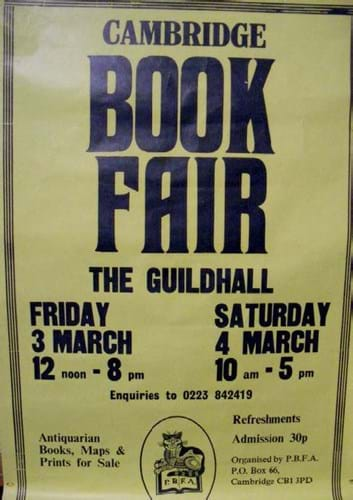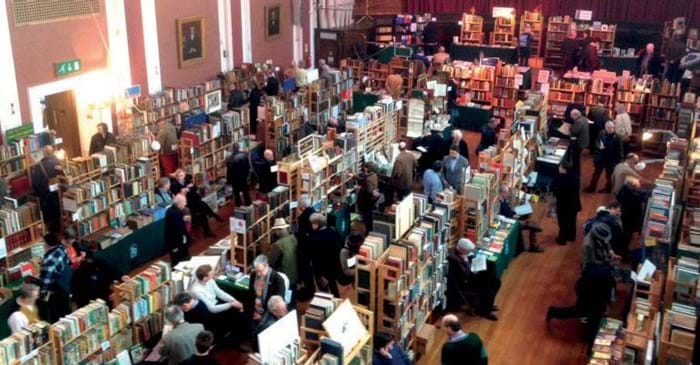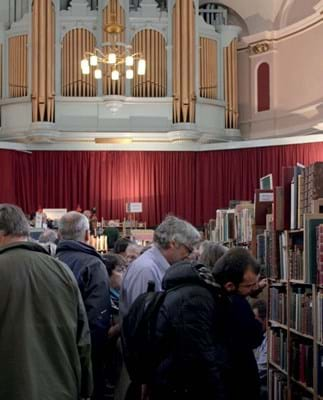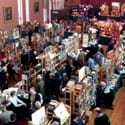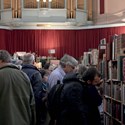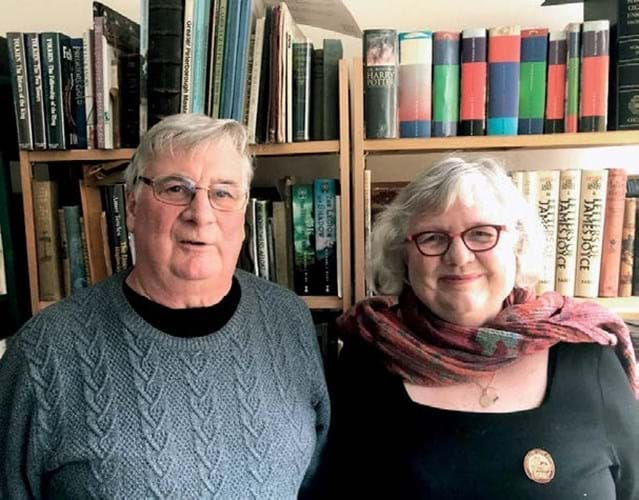
Sarah Key and Phil Salin celebrated 30 years at the helm of the PBFA’s Cambridge Premier book fair in February.
ATG: When did you join the PBFA?
We had joined the PBFA in 1990 as full-time booksellers with a family to support and at the time we were most certainly regarded as ‘young’ members, or less politely, ‘fresh blood’.
You started running the fair shortly after – how did that come about?
Back in 1992, the volunteer team who had been managing the fair had been in place for some time and retirement beckoned, so as ‘young’ newbies, we were asked to take it over in February 1993.
We agreed because managing a fair on behalf of the association did have a few perks such as a free stand at the fair plus priority for a place at some of the other PBFA-run fairs.
What does it take to run a successful event in 2023?
A lot of dexterity, both physical and mental.
The ethos of the PBFA still is that the association is run as a co-operative, with members volunteering to do those jobs which would otherwise incur huge expenditure: managing book fairs, transporting equipment and serving on committees in an executive capacity. An old-fashioned model perhaps, but one which has definitely come back into its own in these post-Covid times.
Our model of using volunteers is crucial, as is the sourcing of effective and cheap advertising, social media, and so on. The PBFA has a very good website with a large following, which helps hugely.
Co-operation between like-minded trade associations as well as links, both friendly and financial, with other related businesses are all vital. Blindly going it alone is no longer an option.
What effect are rising costs having on the event?
Rising costs for our current venue in Cambridge are forcing a move on us. We will remain in the city but move to a venue which is all on ground level, which will cut our bills for porterage and associated staff. Check the PBFA website for details nearer to February 2024.
Obviously [the way to deal with rising costs is] keeping a close eye on the budget and not being afraid to experiment with doing things differently if things get too expensive. Quite often money is saved, and the outcome is not worse.
In general, how has the fair changed over the years?
A bit over 30 years, but not hugely. A few dealers have done all of the fairs and lived to tell the tale, but we have always had a bit of ‘churn’ due to age, infirmity, different ways of trading changing parameters (for example internet trading).
Now we will have to wait and see what our move of venue brings for us. It would be lovely to have lots of new members joining the association and taking over some of the hard work required in running the PBFA and organising book fairs.
How do you work as a partnership?
We are married as well as being business partners and just tend to get on with things. I do most of the advertising, publicity, media side of things and general organisation whereas Phil does the hard graft of planning stands, layout, and seeing to that side of things.
Do you ever buy at the fair?
Yes – some beautiful AA Milne first editions, very rare Louis Wain books, rare early children’s books and all sorts of stock for our shop in Cambridge, The Haunted Bookshop.
How has the book trade changed in your experience?
I think the main thing to say is that far more people now come into the trade with substantial financial backing.
It must be much harder to start from very low beginnings and work one’s way up. It is probably easier to do that in the auction world than as a bookseller, but I am sure that there are plenty of exceptions and that some people do manage it.
It is much easier to set a price for one’s books these days; you no longer have to commit a string of prices to memory in order to be a bookseller and buy and sell sensibly, you just need a good phone – and a good nerve.
How has the internet changed the trade?
It has resulted in less specialism by subject and more by dealing in particularly fine-conditioned material, rare items or bindings. There is also far more emphasis on the physicality of the book – a backlash against ebooks.
What is ‘trending’ at the moment?
Real-time physical events are experiencing a bit of a renaissance, as people tear themselves away from the loneliness and isolation of the long-distance laptop and re-engage with colleagues and customers in person the world over.
A face-to-face sale or purchase of a book is less of a gamble and does not involve boring and tortuous shipping complications.
Meanwhile, the current trend for curation means that some dealers are bringing much less stock which is much better researched and the standard of display is higher.
The flipside of this is that the experience of a fair can be less exciting because the treasure-hunting element of rummaging through an interesting pile of un-curated material, which may be priced too cheaply, is less frequent.
However, by and large, one will always find some stalls at a PBFA fair where one can rummage a bit and there have always been treasures unearthed at the Cambridge fair – often in the maps, prints and photo areas.


